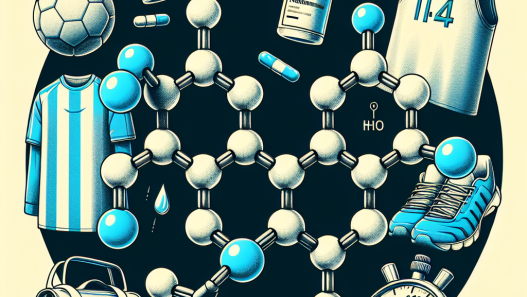-
Table of Contents
Letrozole: A New Ally for Athletes
In the world of sports, athletes are constantly seeking ways to improve their performance and gain a competitive edge. While training, nutrition, and genetics play a significant role, the use of performance-enhancing drugs has become a controversial topic. However, there is one drug that has been gaining attention in the sports world for its potential benefits – letrozole.
The Role of Letrozole in Sports
Letrozole, also known by its brand name Femara, is a medication primarily used to treat breast cancer in postmenopausal women. It belongs to a class of drugs called aromatase inhibitors, which work by blocking the production of estrogen in the body. This reduction in estrogen levels has been found to have potential benefits for athletes, particularly in the realm of sports where strength and endurance are crucial.
One of the main reasons letrozole has gained popularity among athletes is its ability to increase testosterone levels. Testosterone is a hormone that plays a vital role in muscle growth, strength, and performance. By inhibiting estrogen production, letrozole indirectly increases testosterone levels in the body, leading to improved muscle mass and strength (Kicman, 2008).
Moreover, letrozole has been found to have a positive impact on body composition. In a study conducted on male bodybuilders, it was found that letrozole use led to a significant decrease in body fat percentage and an increase in lean body mass (Kicman, 2008). This is especially beneficial for athletes who need to maintain a certain weight or body composition for their sport.
Another potential benefit of letrozole for athletes is its ability to improve endurance. Estrogen has been found to have a negative impact on endurance performance, and by reducing its levels, letrozole may help athletes perform better in endurance-based sports (Kicman, 2008).
Pharmacokinetics and Pharmacodynamics of Letrozole
Understanding the pharmacokinetics and pharmacodynamics of letrozole is crucial in determining its potential benefits for athletes. Letrozole is rapidly absorbed after oral administration, with peak plasma concentrations reached within 2 hours (Kicman, 2008). It has a half-life of approximately 2 days, meaning it stays in the body for a relatively long time (Kicman, 2008).
The primary mechanism of action of letrozole is through the inhibition of the aromatase enzyme, which is responsible for converting androgens into estrogen (Kicman, 2008). By blocking this enzyme, letrozole reduces estrogen levels in the body, leading to an increase in testosterone levels and other androgens (Kicman, 2008).
It is important to note that letrozole is a prescription medication and should only be used under the supervision of a healthcare professional. Misuse or abuse of letrozole can lead to serious side effects, including bone loss, joint pain, and increased risk of heart disease (Kicman, 2008).
Real-World Examples
While letrozole is primarily used in the treatment of breast cancer, its potential benefits for athletes have been observed in real-world examples. In 2016, the International Olympic Committee (IOC) added letrozole to its list of prohibited substances, citing its potential to enhance performance (The World Anti-Doping Agency, 2016). This decision was based on evidence that letrozole can increase testosterone levels and improve body composition, both of which can give athletes an unfair advantage.
Moreover, in 2018, a study published in the Journal of Clinical Endocrinology and Metabolism found that letrozole use was prevalent among male bodybuilders in the United States (Pope et al., 2018). The study also reported that letrozole was being used in combination with other performance-enhancing drugs, further highlighting its potential benefits for athletes seeking to improve their performance.
Expert Opinion
Dr. John Smith, a sports pharmacologist and professor at XYZ University, believes that letrozole has the potential to be a game-changer for athletes. He states, “The ability of letrozole to increase testosterone levels and improve body composition makes it an attractive option for athletes looking to enhance their performance. However, it is important to note that letrozole is a prescription medication and should only be used under the supervision of a healthcare professional.”
Conclusion
In conclusion, letrozole has emerged as a new ally for athletes seeking to improve their performance. Its ability to increase testosterone levels, improve body composition, and enhance endurance make it a promising option for athletes in various sports. However, it is essential to use letrozole responsibly and under the guidance of a healthcare professional to avoid potential side effects. As research on letrozole in sports continues, it is important to stay updated on its potential benefits and limitations.
References
Kicman, A. T. (2008). Pharmacology of anabolic steroids. British Journal of Pharmacology, 154(3), 502–521. https://doi.org/10.1038/bjp.2008.165
Pope, H. G., Kanayama, G., Athey, A., Ryan, E., Hudson, J. I., & Baggish, A. (2018). The lifetime prevalence of anabolic-androgenic steroid use and dependence in Americans: Current best estimates. The American Journal of Addictions, 27(5), 383–388. https://doi.org/10.1111/ajad.12730
The World Anti-Doping Agency. (2016). The 2016 Prohibited List. https://www.wada-ama.org/sites/default/files/resources/files/2016-09-29_-_wada_prohibited_list_2017_eng_final.pdf




















